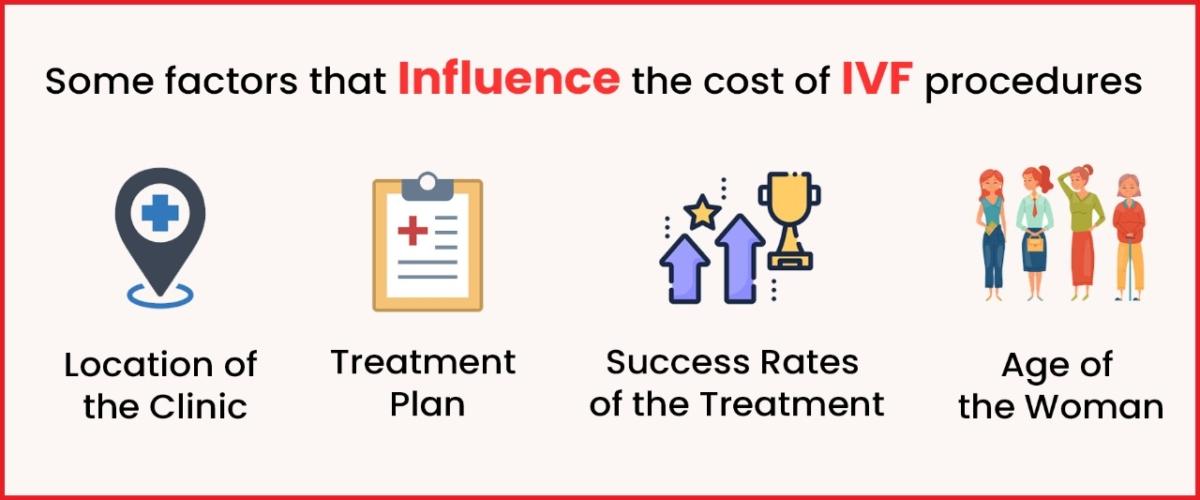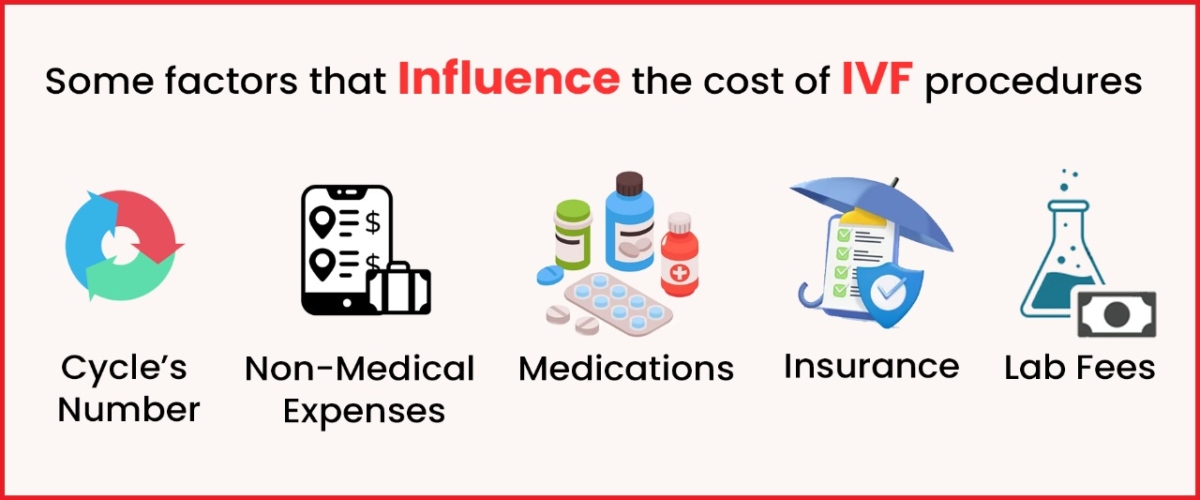Top 10 Factors that Influence the Cost of IVF Procedures
Factors that Influence the Cost of IVF Procedures – IVF, In vitro fertilization, is a way or solution for couples who want a baby but are facing infertility. In vitro fertilization is a way or solution for couples who want a baby but are having trouble. Infertility treatment helps these couples to make their dream come true.
However, IVF can be high in price and complicated. Its cost may vary on different factors. Knowing about all these factors plays a vital role. In this article, you will learn about the top 10 factors that influence the cost of IVF procedures.
We’ll cover where the clinic is, the treatment plan, and how complicated things are. We’ll also give some ideas on how to handle the cost of IVF and ways to get help paying for it.
Here are some factors that influence the cost of IVF procedures:

Location of the Clinic
The geographical location of the IVF clinic considerably influences the cost of IVF infertility treatment. IVF centres are in well-populated areas where the cost of living is higher. They pass high operational costs to patients, making treatment services more expensive.
In urban areas, the demand for quality IVF treatment is typically higher than availability so that treatment providers can dictate prices. Treatment centres in rural areas – where the cost of living is lower – charge less for services. IVF patients should incorporate the cost and quality of care in their review of IVF centres. The clinic’s location is a vital factor influencing the cost of IVF procedures.
Treatment Plan
The cost of IVF infertility treatment may vary as per the treatment plans of the patients, which generally includes the number of cycles needed and additional tests like genetic testing or egg freezing.
Price may be higher if the treatment is more complex because it increases the required medications, doctor visits, and resources. Additionally, the need for multiple cycles or additional procedures adds to the increase in the price of the patient’s IVF infertility treatment.
Success Rates of the Treatment
IVF centres with higher success rates often command higher fees for their IVF procedures. Patients are also willing to pay more to ensure higher chances of successful conception and pregnancy. Therefore, a clinic’s success rate can influence its pricing structure, with higher success rates typically correlating with higher fees.
Age of the Woman
The age of the Woman is a vital factor that influences the price of IVF infertility treatment. The older the Woman, the more the treatment is needed, and it may have lower success rates. All these causes lead to the price of the treatment. As women get older, they might need some extra care and medications to have a baby through IVF infertility treatment. It means they might need extra treatments and might have to try IVF infertility treatment more than once. Because of this, the total cost of IVF can be higher for older women.

Cycle’s Number
The number of IVF infertility treatment cycles that are required for a successful and safe delivery may affect the overall cost. Multiple times, treatment cycles may be needed to achieve pregnancy, and each cycle adds the price to the overall bill. Therefore, the number of cycles necessary for success is a critical factor in determining the cost of IVF procedures.
Non-Medical Expenses
Non-medical expenses are also a main factor influencing the price of the IVF procedure, including travel, accommodations, food, and more. These additional expenses also add a lot to the overall bill for the IVF procedure. So, it is said to be financially good before planning for IVF infertility treatment.
Medications
The cost of IVF infertility treatment medicines is the main expense of this treatment. Medication is one of the main factors in the overall expense of IVF infertility treatment. Different IVF protocols require varying types and amounts of medication, each with its own associated cost. Therefore, medication costs play a significant role in determining the total expenses incurred by patients undergoing IVF infertility treatment.
Insurance
Insurance Coverage is a vital factor influencing the cost of IVF procedures. The extent of insurance coverage and the clinic’s acceptance of specific insurance plans can influence out-of-pocket costs for IVF infertility treatment. Patients with comprehensive insurance coverage may have lower expenses, as their insurance plan may cover some or all IVF procedure costs. Conversely, patients without adequate insurance coverage may face higher out-of-pocket expenses for IVF infertility treatment. Therefore, understanding insurance coverage and the accepted insurance plans is essential when considering the financial aspects of IVF infertility treatment.
Lab Fees
Laboratory services, appointments, and embryo storage are important components contributing to the overall expense of IVF infertility treatment. The cost of all these facilities is very high. The cost of handling and analysis of the samples may also be high. The cost of storing embryos may also increase the price of the IVF. Patients should be ready to bear some extra expenses while undergoing IVF infertility treatment.
Financing Options
Many clinics offer help to their patients for IVF. They allow the patients to pay the fees in monthly instalments or any other preferred payment option. The financing programs offer a loan or credit card for IVF infertility treatment fees. These financing options are available in all the clinics, and these programs help the patients to conceive their babies whether they are financially stable.
Planning for IVF treatment? Make an informed decision with Imprimis IVF.
Above, we have covered all the factors that influence the cost of IVF procedures. Understanding these factors is important for those who will consider this treatment. By being aware of these factors, individuals and couples can make informed decisions and better prepare for the financial aspects of their fertility journey.
Ultimately, IVF aims to help people achieve their dream of starting or expanding their family, and understanding the costs involved is a crucial step in that process. You can also visit our official website for more information, and you can search for other topics as well.






